Marc Cavazza
Large Language Models Preserve Semantic Isotopies in Story Continuations
Oct 06, 2025



Abstract:In this work, we explore the relevance of textual semantics to Large Language Models (LLMs), extending previous insights into the connection between distributional semantics and structural semantics. We investigate whether LLM-generated texts preserve semantic isotopies. We design a story continuation experiment using 10,000 ROCStories prompts completed by five LLMs. We first validate GPT-4o's ability to extract isotopies from a linguistic benchmark, then apply it to the generated stories. We then analyze structural (coverage, density, spread) and semantic properties of isotopies to assess how they are affected by completion. Results show that LLM completion within a given token horizon preserves semantic isotopies across multiple properties.
Echo State Networks for Bitcoin Time Series Prediction
Aug 07, 2025Abstract:Forecasting stock and cryptocurrency prices is challenging due to high volatility and non-stationarity, influenced by factors like economic changes and market sentiment. Previous research shows that Echo State Networks (ESNs) can effectively model short-term stock market movements, capturing nonlinear patterns in dynamic data. To the best of our knowledge, this work is among the first to explore ESNs for cryptocurrency forecasting, especially during extreme volatility. We also conduct chaos analysis through the Lyapunov exponent in chaotic periods and show that our approach outperforms existing machine learning methods by a significant margin. Our findings are consistent with the Lyapunov exponent analysis, showing that ESNs are robust during chaotic periods and excel under high chaos compared to Boosting and Na\"ive methods.
Proceedings of 1st Workshop on Advancing Artificial Intelligence through Theory of Mind
Apr 28, 2025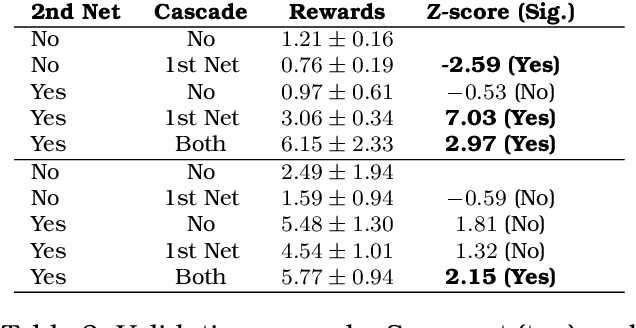


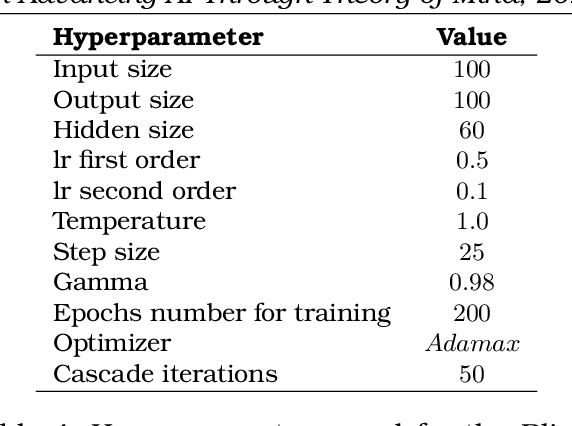
Abstract:This volume includes a selection of papers presented at the Workshop on Advancing Artificial Intelligence through Theory of Mind held at AAAI 2025 in Philadelphia US on 3rd March 2025. The purpose of this volume is to provide an open access and curated anthology for the ToM and AI research community.
Multi-Objective Evolutionary Beer Optimisation
Apr 13, 2022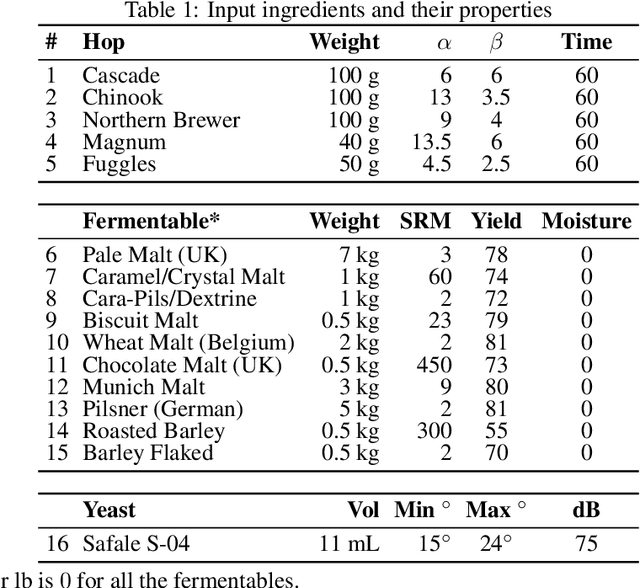

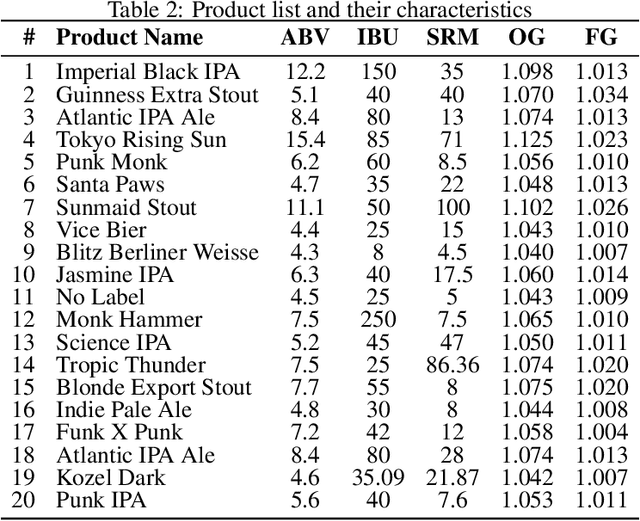
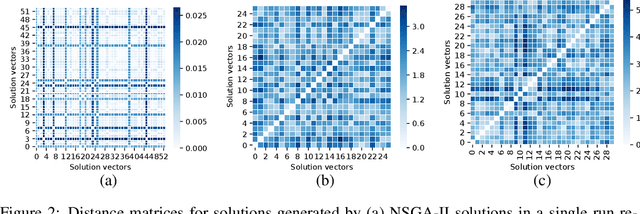
Abstract:Food production is a complex process which can benefit from many optimisation approaches. However, there is growing interest in methods that support customisation of food properties to satisfy individual consumer preferences. This paper addresses the personalisation of beer properties. Having identified components of the production process for craft beers whose production tends to be less standardised, we introduce a system which enables brewers to map the desired beer properties into ingredients dosage and combination. Previously explored approaches include direct use of structural equations as well as global machine learning methods. We introduce a framework which uses an evolutionary method supporting multi-objective optimisation. This work identifies problem-dependent objectives, their associations, and proposes a workflow to automate the discovery of multiple novel recipes based on user-defined criteria. The quality of the solutions generated by the multi-objective optimiser is compared against solutions from multiple runs of the method, and those of a single objective evolutionary technique. This comparison provides a road-map allowing the users to choose among more varied options or to fine-tune one of the favourite identified solution. The experiments presented here demonstrate the usability of the framework as well as the transparency of its criteria.
Generalization Error Bound for Hyperbolic Ordinal Embedding
May 21, 2021Abstract:Hyperbolic ordinal embedding (HOE) represents entities as points in hyperbolic space so that they agree as well as possible with given constraints in the form of entity i is more similar to entity j than to entity k. It has been experimentally shown that HOE can obtain representations of hierarchical data such as a knowledge base and a citation network effectively, owing to hyperbolic space's exponential growth property. However, its theoretical analysis has been limited to ideal noiseless settings, and its generalization error in compensation for hyperbolic space's exponential representation ability has not been guaranteed. The difficulty is that existing generalization error bound derivations for ordinal embedding based on the Gramian matrix do not work in HOE, since hyperbolic space is not inner-product space. In this paper, through our novel characterization of HOE with decomposed Lorentz Gramian matrices, we provide a generalization error bound of HOE for the first time, which is at most exponential with respect to the embedding space's radius. Our comparison between the bounds of HOE and Euclidean ordinal embedding shows that HOE's generalization error is reasonable as a cost for its exponential representation ability.
Beer Organoleptic Optimisation: Utilising Swarm Intelligence and Evolutionary Computation Methods
Apr 07, 2020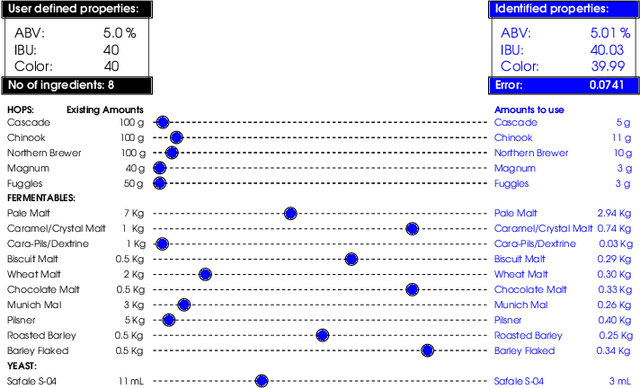
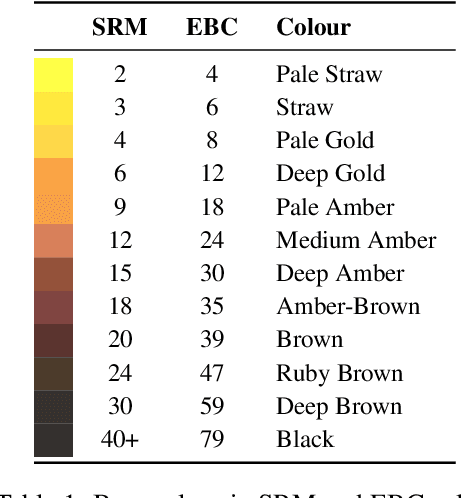
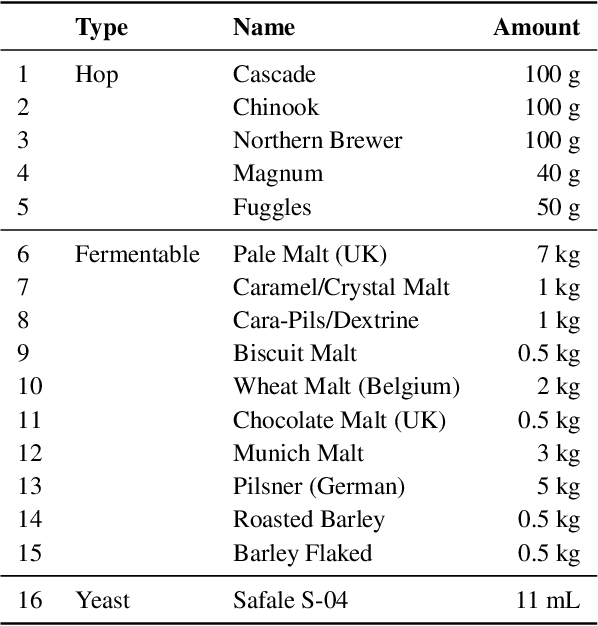

Abstract:Customisation in food properties is a challenging task involving optimisation of the production process with the demand to support computational creativity which is geared towards ensuring the presence of alternatives. This paper addresses the personalisation of beer properties in the specific case of craft beers where the production process is more flexible. We investigate the problem by using three swarm intelligence and evolutionary computation techniques that enable brewers to map physico-chemical properties to target organoleptic properties to design a specific brew. While there are several tools, using the original mathematical and chemistry formulas, or machine learning models that deal with the process of determining beer properties based on the pre-determined quantities of ingredients, the next step is to investigate an automated quantitative ingredient selection approach. The process is illustrated by a number of experiments designing craft beers where the results are investigated by "cloning" popular commercial brands based on their known properties. Algorithms performance is evaluated using accuracy, efficiency, reliability, population-diversity, iteration-based improvements and solution diversity. The proposed approach allows for the discovery of new recipes, personalisation and alternative high-fidelity reproduction of existing ones.
 Add to Chrome
Add to Chrome Add to Firefox
Add to Firefox Add to Edge
Add to Edge